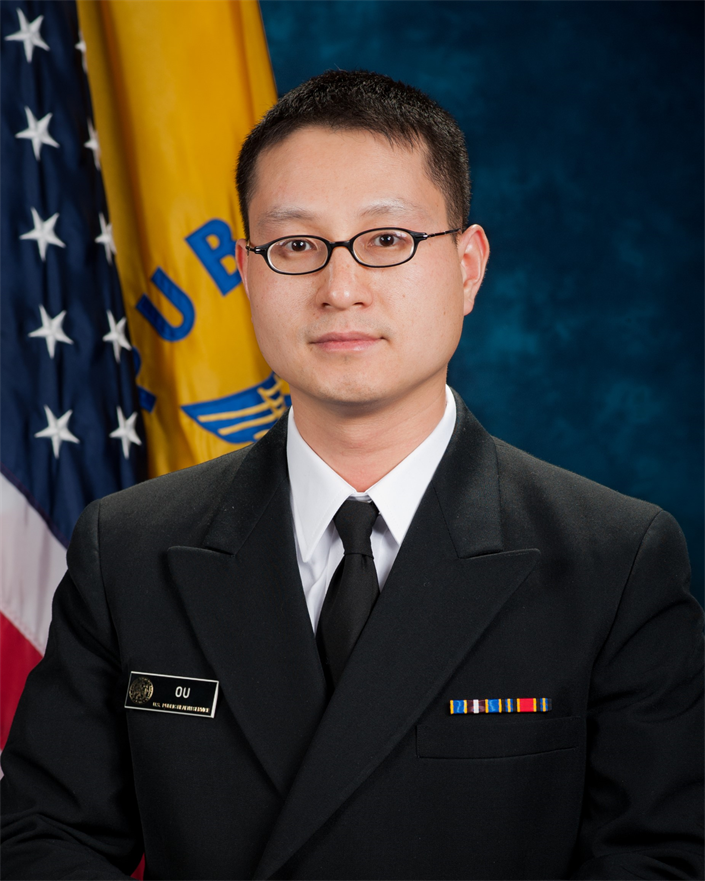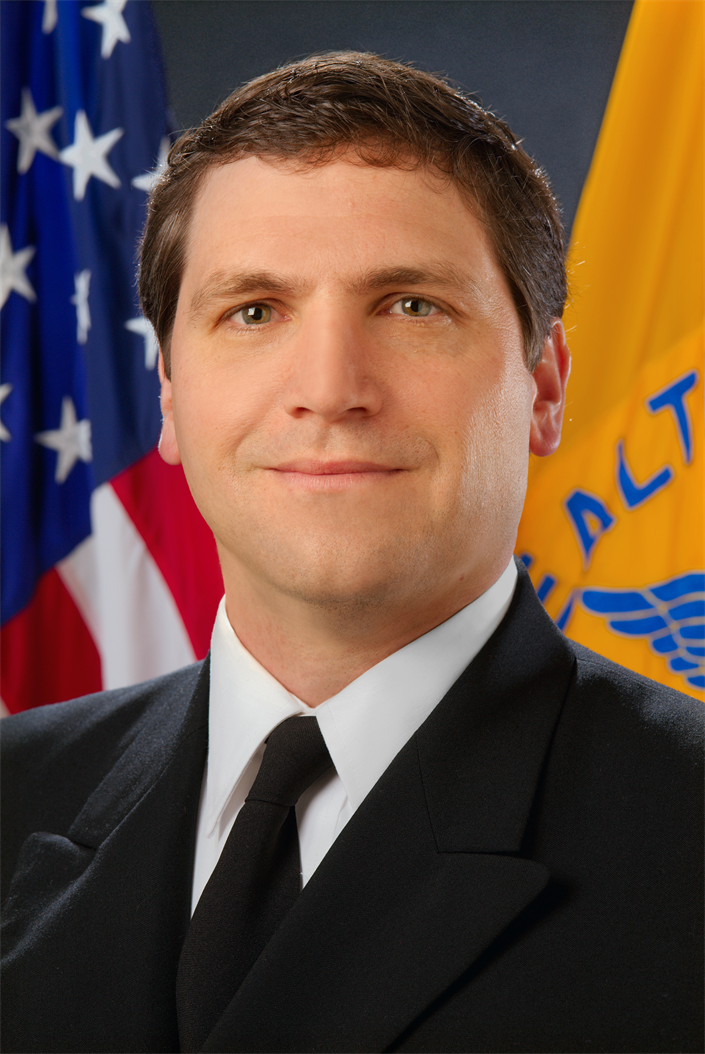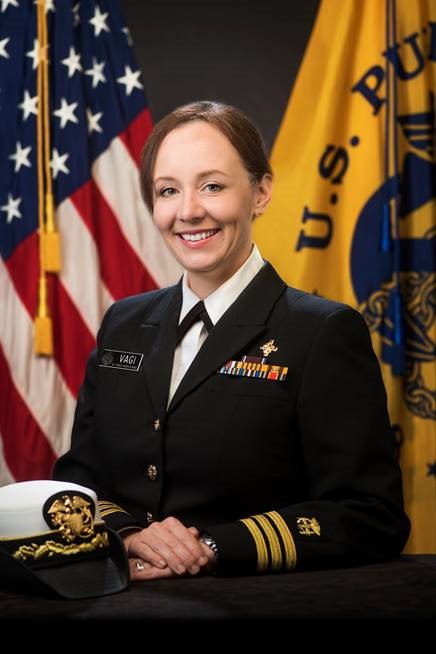2019 Junior Scientist Officer of the Year Award Winner
LCDR Oliver Ou

LCDR Oliver Ou currently serves as Chemist for Office of Public Health Science, Food Safety and Inspection Service (FSIS), US Department of Agriculture (USDA). As a Quality Assurance Specialist at the USDA, LCDR Ou led the review of multi-residue methods for analyzing meat samples for animal drug residues, pesticides, and environmental contaminants. These high-throughput analytical methods were critical for effectively monitoring the increasing number of chemical residues and protecting public health. His accomplishment was recognized by the agency’s prestigious “Rising Professional Award” in 2016, which recognizes outstanding professionals whose actions show that they take the initiative and “hit the ground running” by making important contribution to protect public health.
Additionally, he made major contributions to ensure the smooth transfer of the inspection program for Siluriformes fish from the FDA to the FSIS. LCDR Ou was the lead to review of data packages generated by the FSIS laboratories, applying his unique knowledge of residue chemistry, laboratory system and international standards. He ensured accurate execution of each step of the process, from protocol design to final data review. LCDR Ou’s accomplishments ensured that the FSIS laboratory system had the capabilities to test Siluriformes fish for chemical residues in early 2016 when FSIS assumed primary inspection responsibility for Siluriformes fish. In 2017, more than 100,000 chemical analytes were tested in 635 Siluriformes fish samples by using these multi-residue methods. A total of 23 residue violations were detected in the same year. The development of these methods resulted in detection of violative residues in Siluriformes fish and ensuring that adulterated products did not reach consumers.
LCDR Ou also made significant contributions to the FSIS Accredited Laboratory Program (ALP). He exerted outstanding efforts to modernize the ALP by spearheading both in-house proficiency sample creation and gaining ISO-17034 accreditation as a Reference Material Producer. The ALP is one of very few accredited Reference Material Producers in the entire federal government and the only one for food chemistry and chemical residues in meat and poultry products.
LCDR Ou’s success was facilitated through his position as President-Elect of Southern Section Association of Official Analytical Chemists (SSAOAC) and his deep involvement with the analytical science community. AOAC is a worldwide authority on developing global acceptable standards and official analytical methods. Furthermore, LCDR Ou served as US Subject Matter Expert (SEM) to international organizations to develop US position on global standardization activities.
LCDR Ou has been an incredibly active member and leader of the SciPAC, JOAG and Minority Officers Liaison Council (MOLC) since joining the Corps, and has an extensive record of leadership, serving as Co-Chair of the JOAG COSTEP Connection Subcommittee, Executive Secretary of APAOC, Chair of the APAOC Career Development Subcommittee, Chair of the SciPAC Website Committee, Chair of the Panel Discussion Subcommittee for SciPAC Category Day, and Chair of MOLC. He is a voting member of both SciPAC and APAOC. In 2015, LCDR Ou and his teammates developed and launched a new state-of-the-art website for the USPHS Scientist Category. As the 2018 SciPAC Website Subcommittee Chair, LCDR Ou constantly introduced novel features to the website, making it a “one-stop shop” for Scientist officers and meeting Executive Board needs. In 2017, LCDR Ou served as the Vice Chair of MOLC and led the planning for the annual MOLC Awards Ceremony. He is also a formal mentor to two COSTEP students, two scientist officers, and one APAOC member. Currently, LCDR Ou is leading the APAOC Health Mind Initiative (HMI) to improve mental health literacy in diverse communities. He is also organizing a national essay contest for high school students to provide them the opportunity for self-expression, raise the awareness of psychologic health, and promote communication and understanding among teens, parents, and other caregivers. LCDR Ou is actively engaged in health-related professional/community activities. He receives approximately 20 Letters of Appreciation every year for his work with various community events.
2019 Derek Dunn Memorial Senior Scientist Officer of the Year Award Winner
CDR Matthew Murphy
 CDR Matthew Murphy, PhD, MS, is a senior scientist/epidemiologist with the U.S. Centers for Disease Control and Prevention. Since 2015, he has served with the President’s Malaria Initiative (PMI) as the CDC advisor for the $38 million interagency PMI program in Ethiopia working directly with the Ethiopian government, USAID, and international partners. He guides both PMI and Ethiopia national government malaria research and prevention activities which impact and protect over 55 million people. CDR Murphy has worked to achieve malaria reduction goals in Ethiopia through a variety of activities including investigations of migrant workers at highest risk for malaria, improving private sector partnerships, health service quality assessments, community health programs, data quality improvements, coordination of international partners, and case management studies to improve health worker capacity and patient treatment nationwide.
CDR Matthew Murphy, PhD, MS, is a senior scientist/epidemiologist with the U.S. Centers for Disease Control and Prevention. Since 2015, he has served with the President’s Malaria Initiative (PMI) as the CDC advisor for the $38 million interagency PMI program in Ethiopia working directly with the Ethiopian government, USAID, and international partners. He guides both PMI and Ethiopia national government malaria research and prevention activities which impact and protect over 55 million people. CDR Murphy has worked to achieve malaria reduction goals in Ethiopia through a variety of activities including investigations of migrant workers at highest risk for malaria, improving private sector partnerships, health service quality assessments, community health programs, data quality improvements, coordination of international partners, and case management studies to improve health worker capacity and patient treatment nationwide.
He completed his M.S. in medical entomology studying malaria transmission in East Africa before continuing his vector-borne disease work at the CDC. CDR Murphy later earned his Ph.D. in Environmental Health and Industrial Hygiene at the University of Iowa investigating pesticide-related health risks in West African communities and vector control worker populations. CDR Murphy rejoined the CDC as part of the Epidemic Intelligence Service (EIS) Program working at the National Center for Environmental Health.
He was responsible for leading a variety of public health investigations including domestic and international disease outbreaks, disaster responses, safe water health issues in Navajo Nation and Alaska Native populations, and investigating the public health impacts of chemical exposures. He has also worked with the CDC Prevention Research Centers (PRC) Program before joining the Division of Parasitic Diseases and Malaria in the Center for Global Health.
CDR Murphy has served in nine leadership positions for SciPAC including COF Liaison, Vice Chair, and SciPAC Chair, and served two terms as a voting member. He also served on over 20 agency and USPHS deployments and was the Epidemiology Section Chief for APHT-1. In addition to numerous USPHS awards, he has been honored for his advancement of our public health mission and impact with 12 CDC, FDA, and U.S. State Department awards for excellence in addressing environmental justice health concerns, epidemiological research, and contributions in health emergencies.
2019 Scientist Responder of the Year Award Winner
CDR Sara J. Vagi

CDR Sara J. Vagi is an active public health responder who has experience deploying to domestic and international emergencies through both CDC and the USPHS Commissioned Corps. She has held various positions including unit and task force lead, epidemiologist, and response evaluator through many large responses including the devastating 2017 Hurricane season, CDC’s response to Zika Virus the 2014 Ebola outbreak in West Africa, the 2010 Haiti Earthquake, the 2009 H1N1 Pandemic Influenza outbreak, and the Deepwater Horizon oil spill. She has lead the State Coordination Task Force in CDC’s EOC as well as the Evaluation and Analysis Unit within the taskforce. She also contributed substantially to the development of the CDC toolkit for conducting Community Assessments for Public Health Emergency Response (CASPERs). She conducted multiple CASPERs and trained hundreds of state, local, and federal responders in CASPER techniques.
She is the Deputy Team Commander of USPHS National Incident Support Team – B with whom she has deployed for multiple hurricanes including Harvey (2017), Irma/Maria (2017), Lane (2018), and National Special Security Events such as the Democratic National Convention and the State of the Union Address. As part of her deployment role she has nearly completed the requirements for credentialing as a Situation Unit Lead.
CDR Vagi currently serves as a team lead and epidemiologist in CDC’s Center for Preparedness and Response, Division of State and Local Readiness, Applied Science and Evaluation Branch. She commissioned into PHS and joined CDC in 2008 as an Epidemic Intelligence Service Officer assigned to the National Center for Environmental Health. In that early role, she worked on a Disaster Epidemiology where she obtained her first experiences with leveraging her training in methodology and study design to identify and meet public health needs in emergency response
She completed her master’s degree and PhD in Applied Developmental Psychology from the University of Miami. Having grown up in South Florida, her family frequently prepared for and survived severe tropical weather including Hurricane Andrew in 1992, which remains one of the costliest Category 5 hurricanes in US history. She credits this experience with instilling the passion for preparedness and response that she carries through to her work today.
2019 Scientist Mentor of the Year Award Winner
CDR Anne Purfield
CDR Anne Purfield is the Director of Laboratory Operations for the Clinical Research Branch of the Division of Tuberculosis Elimination at CDC. She leads investigational and operational aspects of Mycobacteriologic laboratory operations for the Tuberculosis Trials Consortium, which is implementing a large multi-national phase 3 clinical trial to shorten the treatment regimen for drug-susceptible pulmonary tuberculosis.
CDR Purfield commissioned in 2008 as a Clinical Microbiology Reviewer of new antiinfective drug products at FDA. She moved to the CDC as an Epidemic Intelligence Service Officer assigned to the Mycotic Diseases Branch where she led response activities for the 2012 outbreak of fungal diseases associated with contaminated steroid manufactured at a compounding pharmacy.
CDR Purfield is an official mentor to six Scientist officers and is known as an unofficial mentor to many more officers. She is happy to help junior officers assimilate to the ways of Corps to become successful public health responders and leaders. As chair of Recruitment, Readiness and Retention subcommittee she implemented new initiatives to foster inclusion and mentorship among newly called to active duty officers, including a regular seminar series for topics presented by junior officers specifically tailored to new officers, a peer support network for junior officers to begin mentoring and provide guidance to new officers, and forums to create a sense of community among cohorts of new officers.